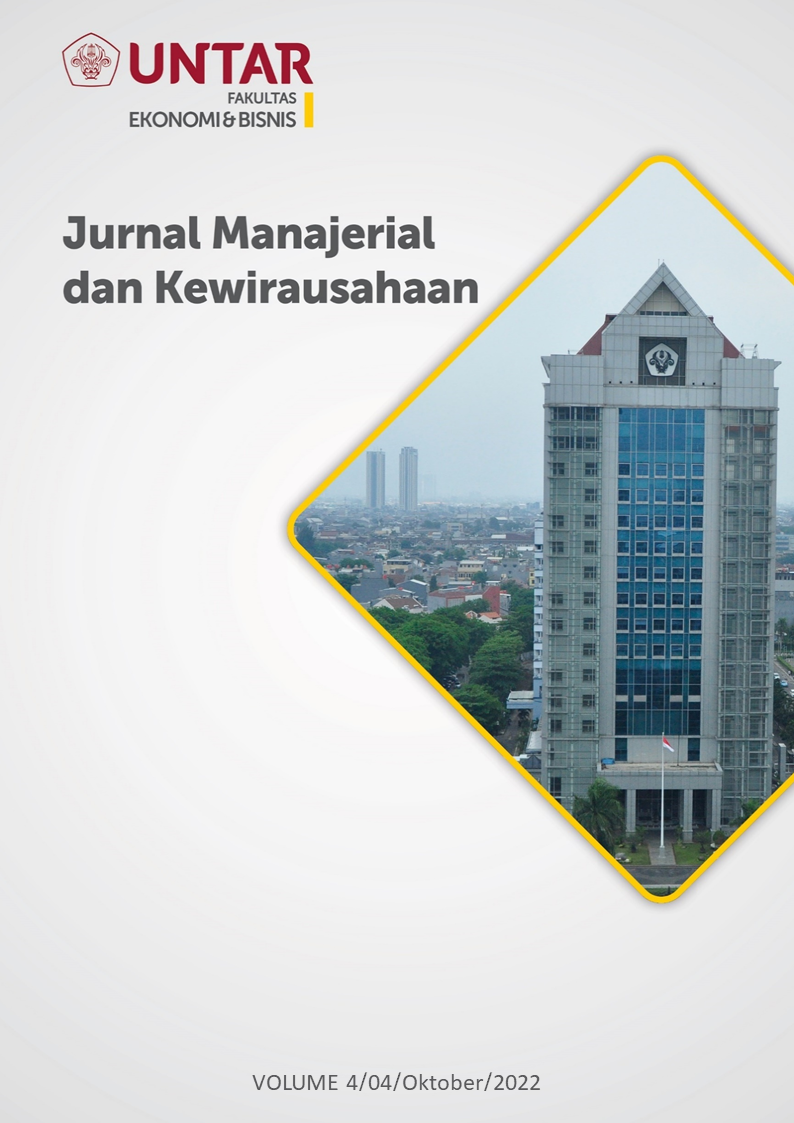Pengaruh Financial Attitude, Risk Perception terhadap Investment Intention pada Pasar Saham Indonesia
Main Article Content
Abstract
Tujuan Penelitian ini adalah untuk menganalisis pengaruh dari sikap keuangan (FA) dan persepsi resiko (RP) terhadap niat investasi (II). Subjek dari penelitian ini adalah generasi milenial di Jabodetabek. Teknik pengambilan sampel menggunakan purposive sampling. Data dikumpulkan dengan menyebarkan kuesioner secara online menggunakan google form. Analisis data menggunakan SEM-PLS. Jumlah data sebanyak 302 responden. Hasil penelitian ini menunjukkan bahwa FA berpengaruh signifikan terhadap II, dan RP berpengaruh signifikan terhadap II.
The purpose of this study was to analyze the effect of Financial Attitudes (FA) on Investment Intentions (II) with Risk Perception (RP) as a mediating variable. The subject of this research is the millennial generation in Jabodetabek. The sampling technique used purposive sampling. Data was collected by distributing online questionnaires using google forms. Data analysis using SEM-PLS. Total data are 302 respondents. The results of this study indicate that FA has a significant effect on II, and RP has a significant effect on II.
Article Details
Section

This work is licensed under a Creative Commons Attribution-NonCommercial-ShareAlike 4.0 International License.
This work is licensed under a Jurnal Muara Ilmu Ekonomi dan Bisnis Creative Commons Attribution-ShareAlike 4.0 International License.,/p>
References
Ajzen, I. (1991). The theory of planned behavior. Organizational Behavior and Human Decision Processes, 50(2), 179–211.
Ajzen, I. (2011). The theory of planned behaviour: Reactions and reflections. Psychology and Health, 26(9), 1113–1127. https://doi.org/10.1080/08870446.2011.613995
Ajzen, I., & Fishbein, M. (1988). Theory of reasoned action-Theory of planned behavior. University of South Florida, 2007, 67–98.
Aren, S., & Hamamci, H. N. (2020). Relationship between risk aversion, risky investment intention, investment choices: Impact of personality traits and emotion. Kybernetes.
Arifin, A. Z. (2018). Influence of financial attitude, financial behavior, financial capability on financial satisfaction. Advances in Social Science, Education and Humanities Research (ASSEHR), 186(1), 100–103. https://doi.org/10.2991/insyma-18.2018.25
Fishbein, M. (2008). Reasoned action, theory of. The International Encyclopedia of Communication.
Furadantin, R. (2018). Analisis Data Menggunakan Aplikasi SmartPLS V. 3.2. 7 2018. Jurnal Manajemen, 1(1), 1–18.
Ghozali, I., & Latan, H. (2015). Konsep, teknik dan aplikasi menggunakan Program Smart PLS 3.0. Universitas Diponegoro. Semarang.
Hartono, W., & Dewantoro, A. W. (2021). Factor Analysis of Millennial’s Stock Investment Intention in Surabaya; Is Accounting Studies Used as A Fundamental Analysis? International Journal of Accounting, 6(32), 165–180.
Hasan, H. N., & Suciarto, S. (2020). The influence of attitude, subjective norm and perceived behavioral control towards organic food purchase intention. Journal of Management and Business Environment (JMBE), 1(2), 132–153.
Listyani, T. T., Rois, M., & Prihati, S. (2019). Analisis Pengaruh Pengetahuan Investasi, Pelatihan Pasar Modal, Modal Investasi Minimal Dan Persepsi Risiko Terhadap Minat Investasi Mahasiswa Di Pasar Modal (Studi Pada PT Phintraco Sekuritas Branch Office Semarang). Jurnal Aktual Akuntansi Keuangan Bisnis Terapan (AKUNBISNIS), 2(1), 49–70.
Salisa, N. R. (2021). Faktor yang Mempengaruhi Minat Investasi di Pasar Modal: Pendekatan Theory of Planned Behaviour (TPB). Jurnal Akuntansi Indonesia, 9(2), 182. https://doi.org/10.30659/jai.9.2.182-194
Sasmita, I. A. G. D., & Piartrini, P. S. (2019). Effect of job attitude, subjective norm and perceived behavior control on employee intention to quit. International Research Journal of Management, IT and Social Sciences, 6(5), 89–94.
Slovic, P. (1987). Risk Perception Paul. Science, 236(4799), 280–285.
Tanuwijaya, K., & Setyawan, I. (2021). Can financial literacy become an effective mediator for investment intention? Accounting, 7(7), 1591–1600. https://doi.org/10.5267/j.ac.2021.5.011
Wijaya, T. dan Sugara, K. S. K. (2020). Pengaruh Income, Financial Attitude, Dan Financial Behaviour Terhadap Financial Satisfaction. Conference on Innovation and Application of Science and Technology (CIASTECH 2020), 11–20. http://publishing-widyagama.ac.id/ejournal-v2/index.php/ciastech/article/view/1837
Yoon, C. (2011). Theory of planned behavior and ethics theory in digital piracy: An integrated model. Journal of Business Ethics, 100(3), 405–417.

